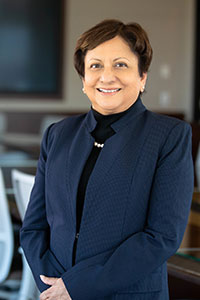Q&A: Dean Zaheer named chair of Minneapolis Fed Board of Directors
Monday, January 13, 2020
Carlson School of Management Dean Sri Zaheer was appointed chair of the Federal Reserve Bank of Minneapolis by the Board of Governors of the Federal Reserve System in Washington D.C.
The Federal Reserve Bank of Minneapolis is responsible for the Ninth District, which ranges from Montana through North and South Dakota, Minnesota, northwestern Wisconsin and the Upper Peninsula of Michigan. The Minneapolis Fed participates in setting national monetary policy, supervises numerous banking organizations and provides a variety of payments services to financial institutions and the U.S. government.
Zaheer, a board member since 2017, discusses the role, the Federal Reserve System, and the University’s long-standing partnership with the Minneapolis Fed below.
Carlson School (CS): What is your reaction to this appointment?
Sri Zaheer (SZ): It is a privilege to be chosen to serve in this important role. I look forward to better understanding and communicating the challenges faced by the industries responsible for the economic vitality of the Ninth District, while working with the Bank’s leadership in support of its mission.
CS: What has your experience on the Board been like?
SZ: It has been one of the most fascinating boards to be on. First of all, it’s been an amazing learning opportunity because you learn about industries and about how the economy is doing all over the country—especially in the Ninth District, which covers a huge area, a long strip along our northern border. It’s so interesting to realize how much variation there is in the economy across this entire region.
CS: The Federal Reserve System in the U.S. has 12 banks. How does that system work and why is it effective?
SZ: The U.S. Federal Reserve System, consisting of the 12 regional Federal Reserve Banks and the Board of Governors, is a very rare central bank in the world of central banks. The reason for the distributed nature of the central bank is they didn’t want Washington, D.C. to have an excessive influence on how monetary policy is made. As a result, each region’s bank is responsible for reporting on the economy in their region to the Federal Open Market Committee, which decides monetary policy for the whole country.
CS: Tell us about the Bank and its current leadership, with whom you will work closely with as chair.
SZ: It’s a joy to work with the current president of the Minneapolis Fed, Neel Kashkari, who is not afraid of taking sometimes contrarian positions that are very well researched and backed up with data and facts. The Federal Reserve Bank itself is one of the best run organizations that I’ve come across. It has very good people who really have devoted themselves to a life of public service. And it’s a real joy to work in an organization like that.
CS: 2019 marked 50 years of partnership between the University of Minnesota and the Minneapolis Fed. Why has this partnership been successful?
SZ: There is a long history of connection between the University and the Minneapolis Fed. One of the reasons the Minneapolis Fed is as prominent as it is — in terms of thought leadership within the Federal Reserve System — is because of its strong connection with the University of Minnesota, particularly the Economics Department. Faculty from Economics have been regular visitors of the Minneapolis Fed; there has almost been a kind of revolving door between the Minneapolis Fed and the faculty here. And that has been a huge advantage, both for the University to be able to attract and retain top-quality faculty as well as for the Minneapolis Fed in terms of the kind of intellectual horsepower they have access to as they make their policy decisions. So, this has been a huge plus for the University and the Minneapolis Fed.
CS: What would you tell Carlson School students about your role and the role of the economy on companies/organizations?
SZ: Business is so influenced by what happens in the economy. It’s really important for our students to pay attention to what is happening economically with unemployment, with inflation, with monetary policy, with what the Federal Reserve is going to do; these things matter to business. And the more our students are able to understand that, the better it is. The economic context in which business operates is something that I personally am very interested in and committed to. That’s why we require economics courses in all of our programs, undergraduate and graduate.
In response to the announcement, Minneapolis Fed President Neel Kashkari said, “I’m looking forward to working with Sri in this role because of the unique perspective and wisdom she brings to the board. We benefit from her international experience, her understanding of the issues facing our business community, and the challenges of educating the future leaders of our region. Sri’s elevation to board chair is also another milestone in our remarkable partnership with the University.”
To learn more about the Federal Reserve Bank of Minneapolis, visit its website: minneapolisfed.org
Business is so influenced by what happens in the economy.
